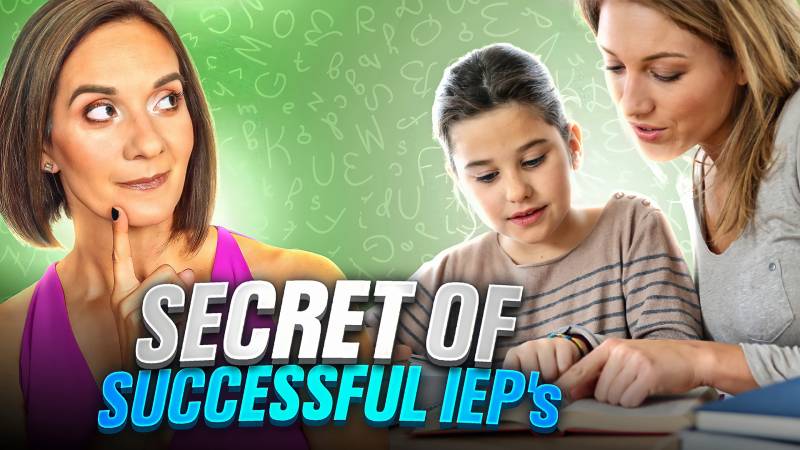
Discover the key to unlocking your child's true potential with personalized education! We are here to guide you through every step of the IEP process, ensuring your child's learning success. From setting long-term goals to addressing challenges, we've got you covered. Join us now and embark on a journey towards a brighter future for your child!
The Secrets To A Successful IEP
When an IEP starts, it's the first step to help your child catch up with their friends. The ultimate goal of an IEP is not to have a child permanently reliant on it but rather to work towards a future where the child no longer needs it. This requires constant follow-up and diligence.
The Journey Towards Independence
An IEP is not a quick fix or a cure-all solution. It involves a long process both to obtain the IEP and to work towards transitioning the child off it. It's essential to set realistic expectations and not assume that the IEP will immediately solve all the child's problems. The IEP is always checked to make sure it's working and to make changes if needed. The main aim of most IEPs is to help the child catch up and learn to work independently.
The Importance of Follow-Up
Once the IEP is in place, your job as a parent is far from over. It's crucial to stay engaged and follow up regularly. Communication with your child's teachers is key. Ensure they are implementing the modifications and accommodations outlined in the IEP. By talking with teachers, you can see if the IEP is working and make changes if needed. Sending clear emails can help keep everyone updated and show how your child is doing.
Data and Regular Assessment
Collecting data is vital to inform the evaluation process. Using tests like math probes can help you see how your child is improving over time. If progress stalls or issues arise, early intervention can be implemented. Regular check-ins and changes to the IEP are key to making sure your child succeeds.
Moving Towards Independence
The ultimate goal of an IEP should be to work towards transitioning the child off it. The earlier you start focusing on developing your child's fundamental learning skills, the better. Don't let your child graduate from high school without the necessary skills to succeed in the real world. Advocate for your child and ensure they are not merely accommodated but challenged to grow and develop their potential.
An IEP marks the beginning of a journey to support your child's education and development. Remember that brains can change and grow through neuroplasticity and neurogenesis. With ongoing assessment and support, your child can catch up and even excel. Being proactive, communicating, and using data can help your child's education. The aim isn't only about having a plan, but helping your child do well.
Key Takeaways:
The Power of Considering the Child's Strengths and Interests in the IEP Process
Every child is a unique individual with their own set of strengths, talents, and interests. Using a child's unique qualities can change their learning experience. In an IEP, it's even more important to consider a child's strengths and interests.
Personalizing the Learning Experience
A big plus of using a child's strengths in the IEP is making learning more personal. Knowing what a child is good at and likes, we can adjust teaching to fit them better. A tailored approach helps keep kids excited about learning, leading to better results.
Centering education on a child's strengths boosts their self-worth and confidence. It encourages a positive learning attitude.
Making Learning Meaningful and Relevant
Adding a kid's favorite things to their learning plan makes school more interesting. They'll enjoy lessons more. For example, if a kid loves animals, using animal behavior in biology lessons can make it more exciting for them.
Linking a kid's hobbies to lessons helps them see how what they learn in school is useful in real life. This way, kids don't just learn better, but also enjoy learning more because it helps them explore their dreams.
Fostering Holistic Development
School isn't just about books. It helps you grow in all ways. Using what you're good at and like can make learning fun and complete. For example, if you're good at painting, doing art in school can help you be more creative, express yourself, and solve problems.
Also, knowing what you like can help explore jobs and build skills. Supporting your passions can guide you to a job you'll love, giving you purpose and direction.
To wrap up, considering your strengths and likes can make learning more effective. This makes learning personal, meaningful, and helps you grow in all ways. It's important for everyone involved in your education to celebrate your unique qualities. By focusing on what you're good at and what you like, we can make school a place where you can do your best and reach your full potential
Are you looking to the tips and tricks to having a successful IEP?
Look no further than the Learning Success System, a do-at-home educational therapy program that addresses cognitive micro-skills and helps with focus, reading, math, confidence, and more. And now, for a limited time only, a free trial is available for those interested in unlocking their child's full potential. Don't miss this opportunity to invest in your child's future!
Learn everything you need to know about IEP's in this new documentary.
Get the full documentary here
Or watch on Amazon Prime Video









